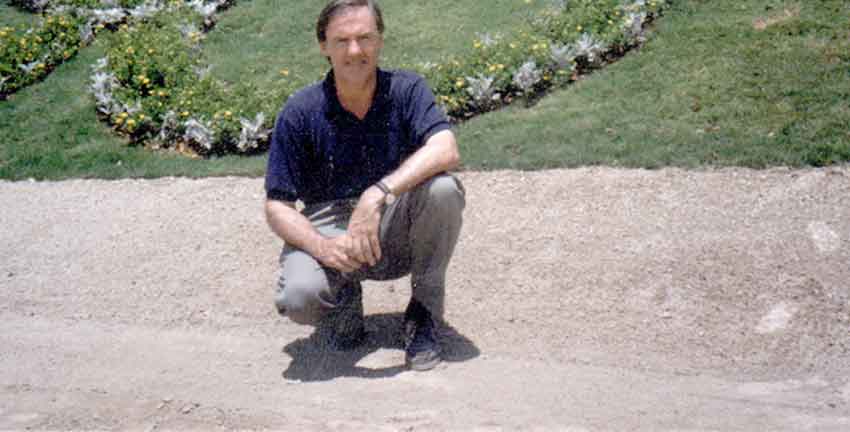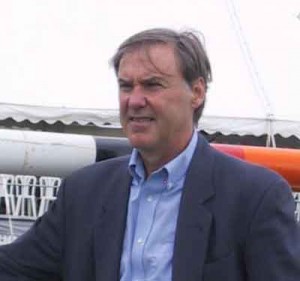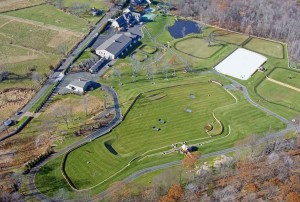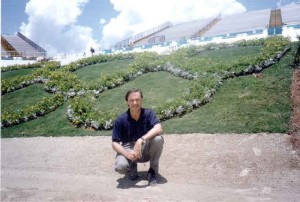
CATCHING UP WITH ROBERT JOLICOEUR
Robert Jolicoeur is a familiar sight on horse farms and showgrounds on the US east coast from New York State down to Florida. A former FEI level 4 course designer, he is a French-Canadian horseman from Montreal who began his career as a course designer for jumping in Bromont at the 1976 Olympics, and since then having designed over 500 grand prix courses. As a specialist in footing and a landscape architect, he was the master planner of the equestrian venue for the 1996 Olympics in Atlanta. He worked with the late Gene Mish of Stadium Jumping for the development of Wellington, Florida as a major equestrian destination.
Writer Glyn Clarke sat down recently with Robert Jolicoeur to discuss his storied equestrian career. Glyn Clarke was a Canadian Newspaper Association’s NNA nominee in 2003.
I would love to know how you got into your line of work?

My father was an architect, that might have pointed me in this direction, my brother and I opened up an equestrian farm in Hudson, outside of Montreal in the early 70’s, we trained silver medalist Michel Vaillancourt. When the Olympics came to Montreal and I was given the chance to do the course design for jumping, I realized just how little attention was being given to what was going on below the level of the riding surface, I took this as a sign that I should take my degree in Landscape Architecture so that I could develop what I consider much safer riding surfaces.
What did you think you were going to be when you grew up?
I have always loved music; while I was growing up I played music with a band for a short time. On the serious side of things, I always figured I would follow in my father’s footsteps, but he always told me not to become an architect, he always said “if the roof leaks, you’re the first one they call”.
What are you doing these days?
I have been keeping busy, things certainly quieted down for me after the recession that began at the end of 2008. It was not a great intersection to be at, construction and horses. Fortunately I didn’t always put all my eggs in one basket. I worked on a pre-construction study for what was to become an equestrian showground in Springfield, Missouri. Latterly I have been working on the east coast with a family who aren’t all riders, and the husband wanted to have something on the property for himself, and he settled on starting a hobby vineyard. This sort of project is interesting for the possibility of also reducing property taxes for being agricultural. I am leaning towards the family farms that are taking the environmental into consideration.
If you could be do anything now, what would you do and why?

I’m a pretty much doing what I want to be doing. What I have been seeing is a trend towards properties that have more to them than just equestrian. I have a new client near Montreal who is interested in doing a private golfing course, not 18 holes, but enough train on, I have worked on a few gold courses. The reason I really like working on this type of projects, I like the challenge, and I like working with nature. I like to take what we have on a property and develop that in a way that is in harmony with nature. For example, I like building ponds, the excavated material can usually be used somewhere else on the project but that in having a place for wildlife to come back to is something ideal. A pond is great for irrigation and in case of fires, it is so easy to recoup the water from the roofs of buildings instead of letting it go across fields it prevents erosion and it can limit run-off into streams and lakes.
Do you plan on retiring? If so, when? How do you feel about it?
I’m in my 60’s now, but I don’t feel that way, I still feel capable and I like what I do, so I don’t see any reason to stop now. That isn’t to say I don’t want to take things a little easier now, I think I’m at a point where I can choose the projects I get involved with. After years of jetting all across America, I find I prefer to limit what I’m doing the Northeast, beautiful country and I can usually drive now. That is my part to reduce my carbon footprint, focusing more on the east coast since that is where I’m located. Retirement isn’t on my mind, let’s be honest, it’s not unheard of that men die within a few years of retirement, I think this is linked to our sense of worth and whether we still have something to contribute. I feel I still have lots to offer.
What lessons has your work life taught you?

It seems we are waking up to the fact that changes in our climate may be due to a general lack of environmental stewardship, I feel farming is a big part of that, it’s no different when it comes to equestrian. We get this idea that farms are a green space, but they are causing erosion and water pollution. The water table is getting deeper and deeper, when we are digging wells there are traces of chemicals and other contaminants. We see wetlands drying up. I believe that when we purchase a property with the intent on building an equestrian farm, not to look at a wetland on the property as a negative, if we develop them properly we can end up with something beautiful and functional. If farms were all made to have retention for a minimum of a week instead at the current rate of drainage it would be a big improvement.
www.iedsopra.com



